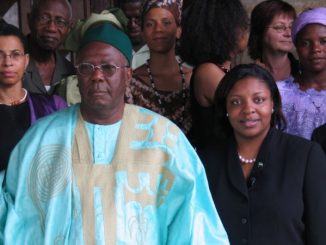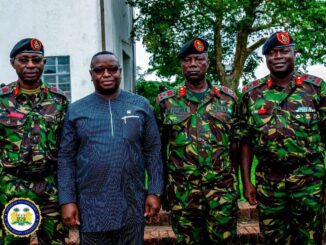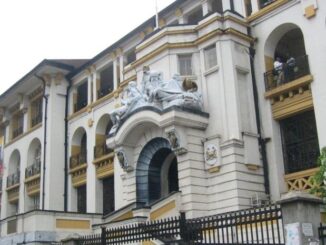
UMARU NAPOLEON KOROMA’S DISHONEST TRIBAL AND ETHNIC POLITICS
By Kabs Kanu.
Umaru Napoleon Koroma, it is naive, deceptive, dangerous , unconscionable and dishonest for you to take only one historian’s perspective of an event or situation and try to build a body of philosophical beliefs and ideology on it.
History is not an objective discipline, we have been variously taught ; On the contrary, history is subjective discipline produced by man , who are subject to their own biases and opinions . You have to balance conflicting, contending perspectives and viewpoints by different historians . You are also not to make conclusive political statements based on them because the viewpoints could be subject to the historian’s subjective beliefs and biases.
It is a staunch SLPP veteran politician, and former presidential candidate, the late Solomon Berewa, a Mende man himself , who , in his famous memoirs, titled , A NEW PERSPECTIVE ON GOVERNANCE, LEADERSHIP, CONFLICT AND NATION BUILDING IN SIERRA LEONE , AUTHORHOUSE 2011, states that tribalism was actually started and implanted in Sierra Leone by Prime Minister Albert Margai of the SLPP . Should anybody build a conclusive political philososopy out of it ?
Another brilliant historian, Professor J.D Allie , in his SIERRA LEONE SINCE INDEPENDENCE : History of postcolonial state, SLWS , 2015 , also highlights the same problems.
Tribalism did not start with President Stevens.It will not end with him. He is not in power today in Sierra Leone where your President you are serving under ( Collective responsibility ) , Mr. Maada Bio , the most tribalistic President ever, has turned tribalism into an enduring governance art of leadership. Almost everybody appointed into governance by your President is a Mende.
Let us be honest. Siaka Stevens did not phase out the railway in Mendeland alone.
Rotifunk, Bauya, Bradford , Mosanki ( with its tremendous palm nuts produce ) and Ribbi, which also enjoyed railway services, in those days , were very much Temne and Lokko lands. So, the railway closure affected them equally. The railway service even extended to Makeni, in the heart of Temneland and the key opposition APC stronghold. Does it therefore make sense to say Stevens closed the railway to hurt mendeland ?
Did Ptesident Stevens cut his nose to spite his face ? Let us look at the facts.
I was a Siaka Stevens bitter critic and he jailed me at the Pademba Road Prisons for that and even forced me to flee the country for my life, so I am not defending him here. I just want to put the facts right.
When the Sierra Leone Railway was phased out in 1973, it affected both Mendeland and Temneland adversely. So, why would Siaka Stevens had torn away the train lines only to make sure that Mendeline did not develop agriculturally, when Temneland equally depended on the railway to transport their produce to the capital ? As a lawyer , who should have excellent logical and analytical skills, does that make sense to you ? Let us be careful how we play tribal and ethnic politics .
I was part of an Industrial survey funded by the UNDP and conducted by the Ministry of Economic Planning and Development ( 1973-75) , with a mende man Dr. Shamsu Mustapha as head of the Industrial Survey Department and another mende man , Mr. Peter Kuyembeh as Permanent Secretary of the ministry. It was an annual holiday job for me while I was a student at FBC. International experts from different parts of the world were involved in the survey . We did a thorough survey of industries , including the Sierra Leone Railway , to find out their profitability potentials ( if at all ) and to determine how to make them economically sustainable enterprises within the remit of the National Development Plan , introduced by the Stevens Government and being partly spearheaded and funded by UNDP. We worked tirelessly on that survey for three years.
At the end of the study, we found out that running the Sierra Leone Railway, especially, was very unprofitable. The government was incurring serious economic losses and being a narrow gauge railway made matters even worse . Spare parts were becoming increasingly difficult to get because that colonial railway machine had gone out of style and the world had moved to a more advanced railway technology with wider gauges.
Therefore, it was decided to phase out the Sierra Leone Railway as a non- profitable enterprise that was causing the government more economic nightmares than conceived . Even the Sir Albert Margai government, before Stevens, had faced the problems and was barely sustaining the unproductive railway service.
Because of lack of spare parts, due to the older and defunct models of trains in use in Sierra Leone, train services had also become very erratic with passenger services very slow and a trip from Pendembu to Freetown lasting many days due to breakdowns on the way. Passengers were having to spend two or three days sleeping in trains for trips that should have lasted few hours.
The decision to phase the railway was based on expert advice and the study conducted by the Ministry of Economic Planning and Development.
The government was advised to introduce nationwide bus and goods haulage services, which it did by bringing in luxurious , air-conditioned Daimler Benz buses and added a comprehensive haulage service to the then Road Teansport Department ( RTD ).
Other Mende students of FBC, like the late Fuard Sheriff and Jacob Lahai- Tarlowoh, took part in the Industrial survey which unearthed these problems . The phasing out of the Sierra Leone Railway therefore had nothing to do with destroying the agricultural potentials of Mendeland —the theory you, Napoleon Koroma, are promoting afer it was postulated by errant historians who did not get their facts right.
The problems of tribalism in Sierra Leone are bigger than Siaka Stevens. If you have read different historical accounts , you would not have been carried away by just one perspective.
John Cartwright in his books , POLITICS IN SIERRA LEONE 1947- 1967 University of Toronto Press. 1970 and POLITICAL LEADERSHIP IN SIERRA LEONE, TORONTO 1978 and Thomas S. Cox in his CIVIL- MILITARY RELATIONS IN SIERRA LEONE –A Case Study of African Soldiers in Politics, Harvard University Press ,1976, also touched on the problems of tribalism in Sierra Leone.
Most of the people, who responded to your post on your Facebook page , are young men and women who may not have studied in depths the political dynamics leading to the dysfunctional and tribal and ethnic politics being played out tragically in Sierra Leone today . You therefore owe them an apology for the deceptive information you fed them.
This kind of dangerous and divisive tribal and ethnic politics must not really be coming from you, a Sierra Leonean holding a key government post and Secretary General of the ruling SLPP.
PART 2 COMING.
–‐—————————-
WHAT UMARU NAPOLEON KOROMA WROTE
“Stevens was much more interested in holding on to power than promoting Mendeland’s exports. His reasoning was simple: whatever was good for the Mende was good for the SLPP, and bad for Stevens. So he pulled up the railway line to Mendeland. He then went ahead and sold off the track and rolling stock to make the change as irreversible as possible. Now, as you drive out of Freetown to the east, you pass the dilapidated railway stations of Hastings and Waterloo. There are no more trains to Bo. Of course, Stevens’s drastic action fatally damaged some of the most vibrant sectors of Sierra Leone’s economy. But like many of Africa’s postindependence leaders, when the choice was between consolidating power and encouraging economic growth, Stevens chose consolidating his power, and he never looked back. “
Daron Acemoglu and James A Robbinson- Chapter 12 Page 337- Why Nations Fail, the Origins of Power, Prosperity and Poverty.
He followed it up with these comments:
Saidu Swaray, do you now see the reason why we have to build this nation all over again and why we need time? And the group that can do that is the one without the Stevens ideology, which still continues to grow in our society.
–‐—————————-
WHAT UMARU NAPOLEON KOROMA WROTE
“Stevens was much more interested in holding on to power than promoting Mendeland’s exports. His reasoning was simple: whatever was good for the Mende was good for the SLPP, and bad for Stevens. So he pulled up the railway line to Mendeland. He then went ahead and sold off the track and rolling stock to make the change as irreversible as possible. Now, as you drive out of Freetown to the east, you pass the dilapidated railway stations of Hastings and Waterloo. There are no more trains to Bo. Of course, Stevens’s drastic action fatally damaged some of the most vibrant sectors of Sierra Leone’s economy. But like many of Africa’s postindependence leaders, when the choice was between consolidating power and encouraging economic growth, Stevens chose consolidating his power, and he never looked back. “
Daron Acemoglu and James A Robbinson- Chapter 12 Page 337- Why Nations Fail, the Origins of Power, Prosperity and Poverty.
He followed it up with these comments:
Saidu Swaray, do you now see the reason why we have to build this nation all over again and why we need time? And the group that can do that is the one without the Stevens ideology, which still continues to grow in our society.





Leave a Reply